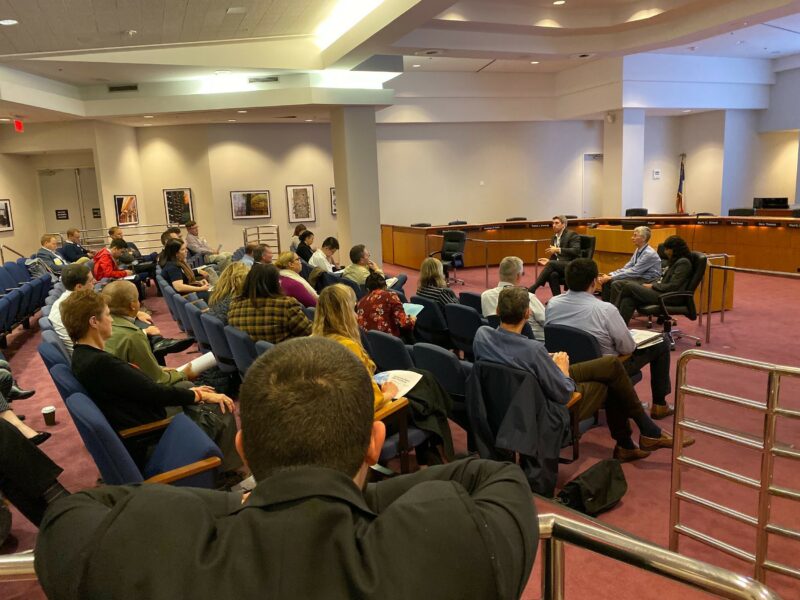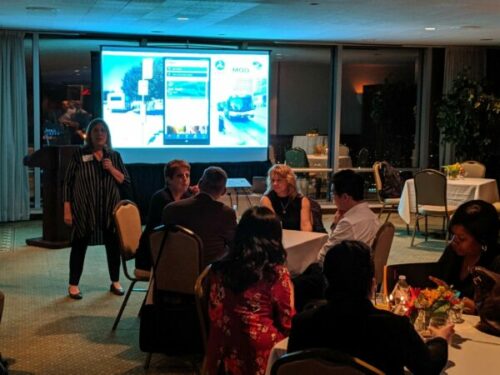
Highlights from the MOD On-Ramp Workshop

On November 21, 2019 the Shared-Use Mobility Center (SUMC) hosted the second Mobility on Demand (MOD) On-Ramp Program workshop in Dallas, TX. More than 70 people including MOD On-Ramp and MOD Sandbox participant agencies, as well as mobility experts from the public, private, and non-profit sectors participated.
The Agenda included technical sessions, breakout discussions, and a field trip, designed to provide participants the opportunity to learn how MOD projects are designed and planned, to share questions and lessons in implementing MOD projects, and to experience from a customer perspective the benefits and challenges of running MOD services.
During the opening remarks, Gary Thomas, Dallas Area Rapid Transit (DART) CEO, detailed the history of the projects through which DART is achieving its vision to incorporate new technologies, as well as innovative partnerships to expand mobility in the Dallas region. SUMC Executive Director Sharon Feigon presented SUMC’s vision to create a multimodal mobility system that works for all, and how SUMC’s work with the FTA’s MOD programs has advanced that vision. Melissa Foreman, Community Planner at FTA Region 6, expressed the FTA’s commitment to support research and innovation projects that explore, demonstrate, and disseminate lessons learned about the potential benefits of mobility on demand services.
The workshop started with a panel of experts discussing Access and Mobility on Demand. Amy Conrick (Community Transportation Association of America) moderated the panel conversations and Q&A session. On the panel, Tony Anderson (Thompson Coburn)’s presentation provided practical definitions distinguishing fixed route service from MOD service as part of the framework to understand how the mandates of the Americans with Disabilities Act apply to each type of service; Antonette Braddock (Regional Transportation Commission of Southern Nevada)’s presentation shared lessons learned from the multiple MOD projects that the agency is running in partnership with local employers, microtransit companies, and transportation network companies; and Robbie Makinen of the Kansas City Area Transportation Authority (KCATA) presented KCATA’s approach to addressing mobility on demand: to think outside the box and to come up with solutions to overcome organizational barriers.
“Transit agencies have to be flexible and nimble enough now to operate in the current ecosystem (…) The word “pilot” is your best friend” and concluded with a call to agencies to “Don’t look for the best practice: BE the best practice.” – Robbie Makinen
The timing of this technical session was particularly relevant for those agencies interested in applying for the FTA Mobility for All Pilot Program Grant.
Next, leaders of the six MOD On-Ramp Program participant agencies presented the development of their MOD projects.
- Bob Franklin presented BART’s project to provide on-demand rides from pre-qualified drivers with access to staged wheelchair accessible vehicles.
- Jade Claytonn (Maryland Transit Administration) gave the progress of his agency’s plan to increase access to employment opportunities through micro transit and to improve the efficiency of a fixed-route bus service.
- Dwight Mengel (Tompkins County, NY) detailed the phases in the development of a mobility-as-a service platform to serve small urban and rural communities.
- John Marron (Indianapolis’ IndyGo) showed how the agency is designing a mobility hub concept for community development and transit investments.
- John Lancaster (Memphis Area Transit Authority ) shared how the agency is using micro transit to efficiently serve a low density urban area.
- Lastly, Chad Ballentine (Capital Metro) detailed how Austin is integrating bike share and transit to create seamless multimodal access.
In the afternoon, workshop participants broke into small groups for an interactive conversation in one of the three breakout sessions: microtransit, accessible mobility on demand, and mobility integration via technology (MaaS) and physical space (mobility hubs).
The technical session on DART’s Mobility on Demand projects featured DART’s innovation team: Todd Plesko, Gregory Elsborg, and Tina Morch-Pierre. In DART’s presentation, Morch-Pierre narrated DART’s history of research and innovation that led to the launch of the GoPass App, supported by a FTA MOD Sandbox grant. Elsborg reflected on the challenges DART is facing in developing an integrated app and emphasized the strategic goal of making the GoPass app available to transit agencies across the country. Plesko described the goals and design of the GoLink project and presented a snapshot of the program performance.
After learning from DART the history, design and implementation of the GoPass and GoLink platforms, workshop participants formed four groups and embarked on a multimodal field trip to experience these products from a customer-perspective. The exercise emphasized how the GoPass app and the GoLink service address questions of equitable access. Field trip teams were tasked with navigating the system from the perspective of an unbanked rider, a rider without a smartphone, and a rider with disabilities.

The multimodal field trip that included riding bus, microtransit, and light rail ended at the Dallas City Club where workshop participants debriefed in their field trip experience, socialized, and enjoyed a great view of Dallas’ skyline.
The Shared-Use Mobility Center thanks DART and its staff for hosting the workshop sessions at their offices, as well as to Spare, Vix, and Routematch for sponsoring this event.

